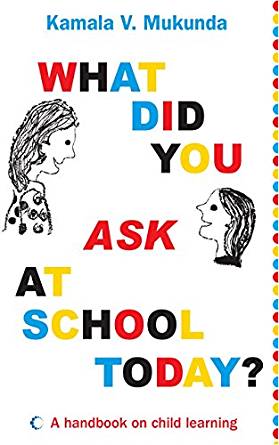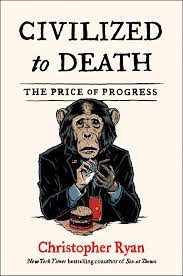Schooling and child learning are topics which generate a keen interest in anyone. In this context it was refreshing to read an outstanding book on schooling and child learning by Kamala V. Mukunda. Kamala Mukunda did her PhD in Educational Psychology from Syracuse University, New York and after teaching undergraduates for a few years she returned to
The background
Most of us will agree that our schooling needs much more attention than what it gets now. There is a mismatch between what we get and what is expected. We must also understand that schools need to catch up with the changing landscape of technology and teaching methods. Our children are learning more and distracted more. There is more pressure on children and they are subjected to more experiments by various agencies. What exactly is the kind of learning we should promote? How shall we equip our teachers with the best teaching aids? How do we motivate our children and whether our assessment methods need a revision? What are the latest thoughts on intelligence and moral development? What is the status of age old nature vs nurture debate? These are only some of the issues discussed by Kamala in her book. In the subsequent paragraphs, we shall go through some of the valuable insights shared by Kamala in her book.
Learning and memory
Learning is the central concern of the book. As we all know, what separates the human being from other animals is that the human child goes to school. The requirements of human beings make it imperative that the child spends so many years in school trying to learn many things. In fact, the human brain has an enormous capacity to learn many things. The ideal situation is that learning should be meaningful and fun for every child and they should enjoy their school. But unfortunately, this is not the case and for a vast number of students, learning is a painful experience and the very thought of school evokes fear for them. This is a major concern for the teachers. How can we make learning more fun? Throughout the book, the author probes that. Sometimes all that is required are small changes in the way we teach. In fact, when it comes to teaching, smaller things matter a lot. For example, the question of why and how helps in deep learning than which and what. Children should be encouraged to go after the reasons, the differences etc
Child development , Nature vs nurture
How early should we send our kids to school and how much we should teach them at a young age are very important questions. So many people think that given the vast increase in quantum of knowledge, we must teach a lot to children at young age itself. This can have really negative consequences. A lot of researches point to the adverse consequences of trying to feed heavy lessons at
Nature vs nurture is one of the oldest debate concerning child development. On several occasions we tend to use this argument in the way we want . When we go deep into the subject what we come across is the way how both are entangled. As we know it is only the human child who takes so many years of learning and that is a pointer to the importance of nurture. When we say nature , we must understand that the environment in which a child grows up is very important. The book talks about three types of environment. Impoverished, normal and enriched. Each of this play a significant role in deciding the future of a child. The conclusion of the author on nature vs nurture debate is very important. The slate is by no means blank, but also that the environment plays a powerful role in developing what we are born with………nature and nurture interact with each other in cyclical ways , beautifully entangled with each other.
Intelligence and motivation
What is intelligence? Who is an intelligent person? These are questions we hear a lot both in school as well as in everyday life. How intelligence is defined and how people are segregated on that basis is very important in school. In India, for a vast majority, intelligence is still the mastery over science and mathematics. Not many people consider the skills in other areas as a mark of intelligence. However, disproportionate importance to any one ability is unhealthy. Many eminent educationists have attempted to define and categorise various types of intelligence. Howard Gardner identified seven types of intelligence. Some scientists
Motivating young students may turn out to be the most challenging task in schooling. Every task becomes easy when we become sufficiently motivated. We are familiar to see the extrinsic motivators such as rank or rewards in making children learn. One interesting probe is, can we have intrinsic motivation where we stimulate the natural urge to learn things. The author define intrinsic motivation as something within us that drive us to accomplish certain goals , to be competent , to feel a sense of freedom and autonomy. In fact it is possible to remove the performance anxiety from children. Teach them anything with imagination and they will enjoy it. One interesting tip from the author is that we can delink the time taken and the learning. If a student takes longer time to learn something , so be it. Learning need not be a competition item. It’s as if we send the message that I can if I try. This attitude is against measuring success relative to others . One need to study for himself and not necessary to outdo others . In such a scenario , the can I do question becomes How can I do? The author discusses in detail the assessment methods too. We have numerous examinations as part of our curriculum and in this context and it is very important that we develop scientific assessment methods which reduce pressure on students. According to the author , what we usually try to measure is performance instead of competence . This is something we should revisit.
A compelling read
None will disagree with the fact that the future of any nation is in its young generation. In such a scenario schooling should top the agenda of any responsible country. Schooling is not only about better building and facilities but sufficiently motivated students and teachers too. As Kamala Mukunda repeatedly tells in her book, our schools have to become places of stress-free learning and positive emotional experiences. More than a place of assessing performance, a school should be a place of learning.
What did you ask at school today? is a must read for anyone interested in children and schooling. Filled with original insights, this book is encyclopaedic in its scope and a thoroughly researched one. It draws vastly from the important research works done in various areas of child learning and psychology and presents them in a lucid manner eminently suitable for the lay reader also. I am sure that this book will compel practitioners of schooling to revisit their current methods. As the back cover tells, it is not only a fantastic textbook on pedagogy but also an enlightening read for parents, social workers, psychologist and counsellors.







No Comments